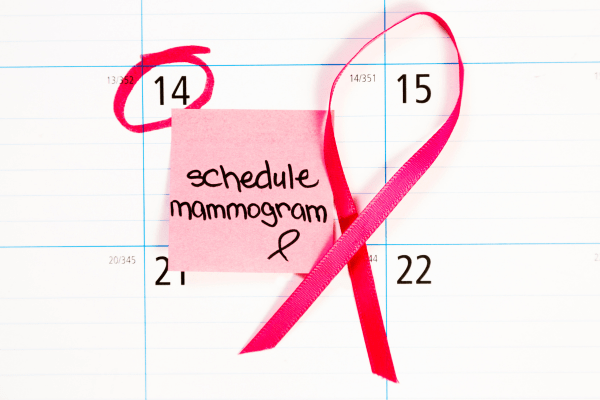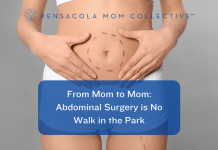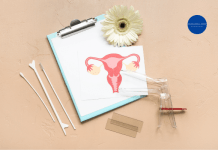 October is Breast Cancer Awareness Month.
October is Breast Cancer Awareness Month.
This week, I am joined by my friend, my business partner, and the woman who delivered my second baby (and coincidentally saved my life), Dr. Ileana Bernal-Blair. We talked about all things breast cancer screening, and I’ve summarized them for the busy mom on-the-go.
The key is this – it’s time to prioritize yourself! Screenings save lives.
This issue hits close to home for so many of us. After all, 1 in 8 women are diagnosed with breast cancer. We’ve all known someone who has been affected. So, let’s take a look at how we can be proactive.
Is breast cancer really that common?
Yes. In fact, breast cancer is the second leading cause of cancer death in American women.
How old should I be for my first mammogram?
To start, what is important here are many factors, but the most important is your AGE and FAMILY HISTORY.
ACOG and the U.S. Preventive Services Task Force recommend starting at age 40. Care should be taken to individualize your plan with your provider, as factors like family history can change the recommended age (to earlier than 40) and the frequency (how often).
What does a mammogram do, exactly?
A mammogram is essentially an x-ray of the breast. During a mammogram, your breasts are compressed between two firm surfaces to spread out the breast tissue, and an x-ray is obtained.
Please note that a screening mammogram (as above) means that you have no concerns or symptoms. This is something done routinely for prevention purposes, like a colonoscopy or a PAP smear.
Radiologists who read mammograms utilize a grading system (called Bi-RADS) when examining the images. Depending on the results, your provider may order further imaging +/- biopsies if there is anything concerning.
What if I feel a lump?
Breast self-awareness is very important as most breast cancer is self-detected. Breast self-awareness means being aware of the normal appearance and feel of your breasts. If you feel a lump and/or something abnormal, call your physician.
What are other signs and symptoms of breast cancer?
-Breast pain
-Changes in appearance of the nipple or skin surrounding it (areola) like redness, dimpling of the skin, irritation, or swelling
-New nipple discharge or nipple inversion
-A lump or mass
Who are candidates for genetic counseling?
Women with a family history of breast, colon, prostate or ovarian cancer, as well as women with a personal history of ovarian cancer, are encouraged to discuss with their physician the need for genetic counseling. Genetic counseling involves taking a deep dive into family history to determine whether genetic testing is indicated.
What are the risk factors for breast cancer?
Unfortunately, most women diagnosed with breast cancer have no identifiable risk factors. The two biggest risk factors are being a woman and getting older.
There are different tools that your doctor will use to stratify your risk, meaning determine your overall risk of getting breast cancer. The risk is often calculated as a percentage and is determined by using online tools.
Are there lifestyle changes I can make to decrease my risk of getting breast cancer?
There are some lifestyle modifications that may lower your risk of breast cancer, including:
-Exercise regularly
-Maintain a healthy weight
-Quit smoking
-Decrease alcohol intake
What’s the take-home message for moms?
We all know it’s easy to stay busy and put your own health on the back burner. But cancer doesn’t care – it doesn’t matter your age, socioeconomic status, marital status, race.
Cancer affects everyone. Being the best mom to your children means taking care of you and making time (which we know feels impossible sometimes).
So please make time. Schedule a well woman exam with your PCP or OBGYN, have a breast exam, and ask about whether it’s time for your screening mammogram. Further, if you have any concerns at all, feel something unusual, or think you have signs/symptoms, make that appointment.
Get assessed. You know your body, and we are here to help.
 {Please note that though we are doctors, we’re not your doctors! The views expressed here are for informational/educational purposes only and do not take the place of consultation from your personal medical specialist. This blog is not meant to diagnose or treat, only to inform. If you are in any way concerned about a medical emergency, please call 911. Otherwise, reach out to your PCP, OBGYN, or other medical specialist with concerns.}
{Please note that though we are doctors, we’re not your doctors! The views expressed here are for informational/educational purposes only and do not take the place of consultation from your personal medical specialist. This blog is not meant to diagnose or treat, only to inform. If you are in any way concerned about a medical emergency, please call 911. Otherwise, reach out to your PCP, OBGYN, or other medical specialist with concerns.}
Websites utilized:
American College of Obstetricians and Gynecologists
UpToDate
U.S. Preventive Services Task Force














